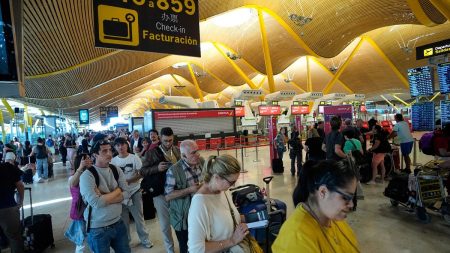The political landscape of Syria is undergoing a dramatic transformation following the downfall of the Assad regime, ushering in a new era marked by both hope and apprehension. Hayʼat Tahrir al-Sham (HTS), the rebel faction instrumental in Assad’s removal, has assumed control, presenting itself as a moderate force while striving to consolidate power and establish connections with other armed groups. This transition, however, is fraught with complexities, raising critical questions about the trajectory of democracy, human rights, and the future of Syrian refugees.
HTS, formerly affiliated with Al-Qaeda, has publicly severed ties with the terrorist organization and even positioned itself as a potential ally in the fight against terrorism. This shift, coupled with pronouncements of tolerance towards religious minorities, has been interpreted by some as a sign of moderation. However, experts caution against premature optimism, emphasizing that HTS’s true nature remains uncertain. Their history of authoritarianism and adherence to Islamic fundamentalist ideology raises concerns about their commitment to democratic principles and genuine respect for minority rights. True tolerance, they argue, extends beyond mere religious practice to encompass full participation in the political decision-making process.
The rights of women and other vulnerable groups also hang precariously in the balance. HTS’s past actions, including the closure of NGOs promoting gender equality and the suppression of political dissent, paint a concerning picture. While acknowledging the brutality of the Assad regime, analysts stress the importance of holding the new government accountable for its human rights record. The future of Syria, they argue, hinges on the ability of Syrian society to organize, advocate for its rights, and build democratic institutions, including independent trade unions, feminist organizations, and local associations, connecting them through national structures to amplify their voices and influence.
The change in leadership in Syria has profound implications for Syrian refugees, particularly those seeking asylum in Europe. Since the outbreak of the civil war in 2011, hundreds of thousands of Syrians have fled their homes, seeking refuge in neighboring countries and Europe. Turkey alone hosts millions of Syrian asylum seekers, and within the EU, Syrians constitute a significant portion of those granted protection status. The overthrow of Assad has triggered a reassessment of asylum policies in several European countries, with Germany, France, and others freezing applications and some even contemplating deportations.
This shift in policy raises complex ethical and legal questions. While the Assad regime’s demise represents a significant change, experts argue that Syria remains far from safe. The widespread destruction of infrastructure, rampant poverty, and the precarious security situation make it untenable to force refugees to return. They emphasize the importance of upholding the right of refugees to choose whether to stay or return voluntarily, based on a realistic assessment of the situation on the ground. Syria’s reconstruction will require substantial international assistance, and the new government must prioritize the needs of its people, ensuring that development benefits the majority rather than a select few.
The future of Syria remains uncertain. The transition from the Assad regime to a new Islamist government presents both opportunities and challenges. While the promise of a break from the past may offer a glimmer of hope, concerns remain about the new government’s commitment to democracy, human rights, and the well-being of all Syrians, including religious and ethnic minorities, women, and the millions displaced by the conflict. The international community has a crucial role to play in supporting Syria’s reconstruction and ensuring a just and equitable future for all its citizens. The path forward will require careful navigation, vigilance, and a commitment to upholding fundamental human rights and democratic principles. The world watches with bated breath, hoping that the nascent transition will lead to a more peaceful and prosperous future for the long-suffering Syrian people. Only time will tell whether the promises of change will translate into tangible improvements in the lives of ordinary Syrians. The international community must remain engaged, providing support for reconstruction while simultaneously holding the new government accountable for its actions and ensuring that the rights of all Syrians are respected and protected.
The rebuilding of Syria presents a formidable challenge, requiring not only physical reconstruction but also the healing of deep societal wounds. The legacy of the Assad regime, coupled with the ongoing security concerns and the complex political landscape, create a challenging environment for the establishment of a stable and democratic society. The new government must prioritize reconciliation, inclusivity, and justice to build a future where all Syrians feel safe, respected, and empowered. This will necessitate addressing the root causes of the conflict, fostering dialogue between different groups, and ensuring accountability for past abuses. The success of this endeavor will depend on the commitment of the new leadership, the active participation of Syrian civil society, and the continued support of the international community.










